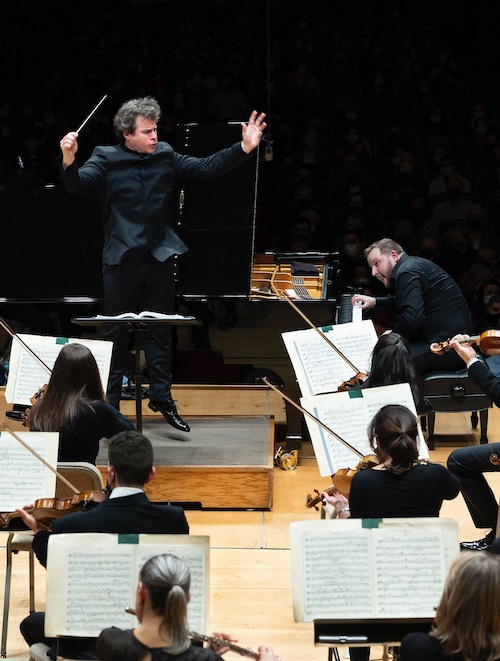Hrůša, Boston Symphony make a delightful case for Dvořák rarity

Jakub Hrůša conducted the Boston Symphony Orchestra with Lukáš Vondráček as soloist in Rachmaninoff’s Piano Concerto No. 2 Thursday night. Photo: Winslow Townson
Jakub Hrůša, whose 2016 debut with the Boston Symphony Orchestra was one of that season’s highlights, made a stirring return to Symphony Hall on Thursday night.
True, the Czech conductor’s program played mainly to his strengths: meaty favorites by Sergei Rachmaninoff and Antonín Dvořák prefaced by an obscure Leoš Janáček’s curtain-raiser.
Even so, the performances he drew from the orchestra were outstanding. In terms of color, character, and sweep, Thursday’s was one of the most satisfying BSO concerts of recent memory.
This was certainly true of the exhilarating reading of Dvořák’s Symphony No. 6 that closed the night. Though not as concise or dramatic as his Seventh or Ninth Symphonies, this 1881 score is one of its composer’s sunniest and most endearing creations.
Thursday’s smartly directed, characterful account made abundantly clear why that’s the case. The first movement’s rhythms danced from the downbeat, Hrůša shaping its lilting phrases with knowing ease and bucolic purpose. Throughout, the BSO’s playing was both energetic and songful: thanks, in part, to Hrůša’s lively tempos, the musical line never got lost in its own thickets. But the conductor’s keen ear also ensured that the symphony’s busy textures were always lucid, particularly its beguiling episodes for woodwinds.
This attention to detail paid dividends, too, during the radiant Adagio, whose melodic writing exuded color, warmth, and charm in equal measure.
In the Scherzo, which Hrůša took at a furious clip, rhythms were taut yet everything remained perfectly under control. Conductor and orchestra gleefully mined the underlying playfulness of the vigorous outer thirds and gave the sweetly blended Trio space to breathe.
As for the exuberant, slightly verbose finale, Hrůša and the BSO imbued the music’s play of rhythmic brio and instrumental color with a strong sense of character and momentum. Though the transition into the coda was a touch frenetic, this was a reading of thrilling spirit and clarity.
A similar fervency marked the night’s account of Rachmaninoff’s Piano Concerto No. 2.
Completed in 1901, this score is rightly regarded for its pianistic brilliance and melodic richness. On Thursday, pianist Lukáš Vondráček, making his BSO debut, navigated its solo part with considerable panache.
Vondráček’s interpretation was conspicuous for its excellent feel for keyboard voicings. From the first movement’s burnished opening to the finale’s Technicolor coda, Vondráček’s performance seemed to know exactly which musical essentials needed to be projected.
His playing also embraced the score’s expressive extremes. The quiet spots—like the Moderato’s ruminative episodes and the slow movement’s gentle arpeggios—unfolded with affecting inwardness. Meanwhile, its grand climaxes, like the bold statements of the finale’s lyrical theme, sang mightily.
What one missed, periodically, were the connections between these moments. At times, Vondráček seemed at a loss for what to make of the concerto’s transitions. Accordingly, there was an episodic character to parts of his reading, especially during the last third of the Moderato (which lost tension as it proceeded) and, again, over the first half of the finale.
Nevertheless, the pianist’s charisma and technical chops ultimately carried the day. Afterwards, he rewarded a rousing ovation with an encore of Robert Schumann’s poignant “Träumerei.”
For his part, Hrůša drew a fluent, flexible accompaniment from the orchestra. The woodwinds’ dovetailing in the Adagio was enchanting, while the finale’s march-like figures snapped.
Likewise invigorating was the BSO’s account of Janáček’s Jealousy.
Originally conceived (but later dropped) as the overture to his opera, Jenůfa, Jealousy is essentially a macabre tone poem based on Slavic folk tales about disfigurement and death.
Breathtakingly unpredictable and fresh, the piece drew an electrifying performance from Hrůša and company. For contrasts of light and shade, tension and release, one could hardly have asked for more—strings shimmered, brasses snarled, woodwinds soared.
Even if one wasn’t following the grim backstory too closely, this was music-making of captivating focus, visceral excitement, and flawless balances: Hrůša is the real deal. The BSO ought to have him back early and often.
The program will be repeated 1:30 p.m. Friday and 8 p.m. Saturday at Symphony Hall. bso.org
Posted in Performances